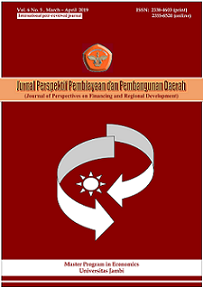The role of Islamic social finance towards alleviating the humanitarian crisis in North-East Nigeria
DOI:
https://doi.org/10.22437/ppd.v6i5.6508Abstract
This paper seeks to examine the role of Islamic social finance towards alleviating the humanitarian crisis in North East Nigeria. The paper revealed the various conceptual definitions of Islamic social finance, its various instruments, update on humanitarian situation. A modified revenue function model was adopted. The study revealed that zakat potentials in Nigeria is estimated to be between USD 8,776.5-USD 21,160.99 million which is alone adequate to fill the humanitarian funding gap. More so, Sadaqah and Waqf was analyzed based on the number of active Telecoms line subscribers and the population statistics of citizens within the ages of 15-69yrs and that If N20 is paid weekly at a 5% level of cash collection error rate, a total amount of about N162b and N106b could be realized yearly respectively which can be used to bridge certain sectors of humanitarian needs in areas of housing, primary health care centres, water, food, empowerment etc. Likewise, the said funds can still be used for investment purposes in areas like mudaraba term deposit, sukuk, stock etc most especially funds realized from cash waqf. The study concluded that by adequately combining the Islamic social finance tools while adopting technology in its collection process & monitoring, it will effectively bridge the humanitarian funding gap as well as resettling and empowering the IDPs. The study recommends legislation of act setting up zakat/waqf, public awareness should be properly done, use of crowd funding approach
Downloads
References
Aliyu, D.H., Muhammad, L,M., Usman, B.S., (2018). The Role of Islamic Social Financing in Empowering Youth and Women in Sokoto State. Journal of Islamic Monetary Economics and Finance. 3. 141-152
Azniza, H A., & Mohamed, A H. (2015), The Possible Role of Waqf in Ensuring A Sustainable Malaysian Federal Government Debt. Procedia Economics and Finance. Science Direct. 31, 333-345
Badeshi (2017). National Primary Health Care Development. Available at: www.budeshi.ng/#menu>chooseadataset>NationalPrimaryHealthCareDevelopment. Retrieved on 29/09/ 2017.
BOSG Report(2016).Counting The cost of Insurgency. Post Insurgency Recovery & Peace Building Assessment Report Presented by BOSG to World Bank. Available at;www.vangaurdngr.com/2016/03/borno-state-counting-the-cost-of-insurgency/amp. Retrieved on 16/06/2017.
Building Contractors Secret (2017).What would it cost to build a standard 2 bedroom flat in Nigeria. Available at www.buildingcontractorssecrets.tk/2017/06/what-would-it-cost-to-build-a-standard-2-bedroom-flat-in-nigeria.html?m=1 Retrieved on 28/09 2017
Castle (2017). Cost of Boreholes ranges from N150k-N1,000,000 depending on location. Available at www.castle.com.ng/magazine/article/construction/ 67
Çizakça, M (1998). Awqaf in History and its Implications for Modern Islamic Economies. Islamic Economic Studies,. 6(1), 43-70.
Economic Confidential (2016).Dangote donates N2billion to Borno IDPs. Available at: https://economicconfidential.com/news/national-news/dangote-donates-n2bn-borno-idps/amp/. Retrieved on 27/06/2017.
Falex Dictionary (2012). Islamic Finance. Available at: http://financialdictionary. Thefreedictionary/Islamic+finance. Retrieved July 30, 2015
FOA (2017). North Easten Nigeria. Situation Report. Food and Agriculture Organisation of United Nations. 1-2
Global Sadaqah Beta (2018).Crowdfunding: The Future of Islamic Social Finance? Available at:https://www.globalsadaqah.com/blog/crowdfunding-future-islamic-social-finance/. Retrieved on 31/12/2018.
Islahi, Abdul Azim, (1992). Provision of Public Goods: Role of the Voluntary Sector (Waqf) In Islamic History. (Financing Development In Islam: Seminar proceeding series IRTI & IDB)
Islamic Social Finance Report (2015). Islamic Research and Training Institute, Islamic Development Bank, Jeddah.
Islamic Social Finance Report (2014). Islamic Research and Training Institute, Islamic
Development Bank, Jeddah.
Kahf, M (2007).Role of Zakah and Awqaf in Reducing Poverty: A case for zakah-awqaf-Based Institutional Setting of Micro Finance. Paper presented at the “International Seminar on “Islamic Alternative to Poverty Alleviation: Zakat,Awqaf and Micro Finance†April 21-23,2007, Bangladesh. In Foyasal, K, “ Waqf: An Islamic Instrument of Poverty Alleviation-Bangladesh Perspective. Thought on Economics. 22(3).
Kahf, ,M,(1998). Financing the Development of Awqaf Property. Working Paper for the Seminar on Development of Awqaf by IRTI, Malaysia. Kuala Lumpur
Kamar, A, Norat M, Pinon M, Prasad A, Towe C, Zeidaine, Z & IMF Staff Team (2015). Islamic Finance: opportunities, Challenges and policy Options. IMF Staff Discussion Note :8-11& 26
Madani, I (2016). Islamic Social Finance. Special Session Summary. Core Responsibility. Five of the Agenda for Humanity. World Humanitarian Summit. Istabul. 23-24. May, 2016.
Magda Ismail, A, (2008).Cash Waqf A New Financial Product Model Aspects Of Shariah Principles On ITS Commercialization, This paper is presented at Islamic Banking, Accounting and Finance Conference (iBAF 2008), organized by Faculty of Economics and Muamalat, Universiti Sains Islam Malaysia, 28-29 July 2008 at The Legend Hotel, Kuala Lumpur 2008
Majlis, E & Amma, J (2016).Zakat for Humanitarian Aid and Development. Wana Institute. Available at:https://wanainstitute.org/sites/sites/default/files/projects/ WL-Zakat_For-Development.pdf
MaRS Centre for Impact Investing. (2016). Available at: http://impactinvesting.marsdd. com/ Retrieved on 31/12/2018.
Mohamed, U, Shahida, S, Abdul, G, & Zaini, E. (2012). Tackling Poverty: A Look at
Cash Waqf. Prosiding PERKEM VII,. 1611-1623.
NBS (2017).National Population Estimates. Available at: https://nigerianstat.gov.ng/ dowload/120. Retrieved 10/01/2019.
NCC (2018). Subscribers Statistics. Available at: https://www.ncc.gov.ng/ stakeholders/statistics-reports/subscribers-data. Retrieved on 10/01/2019.
OCHA (2018).North-East Nigeria; Humanitarian Situation Update. Progress on key activities from the 2018 Humanitarian Plan (Covering 1-31st July,2018). August Edition
Pew Research Center ,(2012). Religious Composition by Country in Percentages. Availableat:www.pewforum.org/2012/12/18table_religious_composition_by_country_in_percentage/Retrieved January05. Retrieved on 05 January 2016
SFC Report (2017). Social Financing: A Sharia Compliant Model. 13-22
Tabash I.M., & Dhankar R.(2014). Islamic Finance and Economic Growth: An Empirical Evidence from UAE. Journal of Emerging issues in Economic, Finance and Banking. 3(2), 1069- 1082.
Wikipedia. (2018). Crowd funding. Available at: https://en.wikipedia.org/wiki/ Crowdfunding.Retrieved on 10/01/2019.
Wikipedia (2017). Boko Haram. Available at: https://en.m.wikipedia.org/wiki/ Boko_Haram Retrieved on 30/09/2017.
World Humanitarian Summit (2016). Islamic Social Finance. Special Session Summary. Core Responsibility Five of the Agenda for Humanity. World Humanitarian Summit. Istabul. 23-24 May, 2016.
Downloads
Published
How to Cite
Issue
Section
License
Copyright (c) 2019 Ibrahim Mohammed Lawal, Jiddah M.A. Ajayi

This work is licensed under a Creative Commons Attribution 4.0 International License.

















